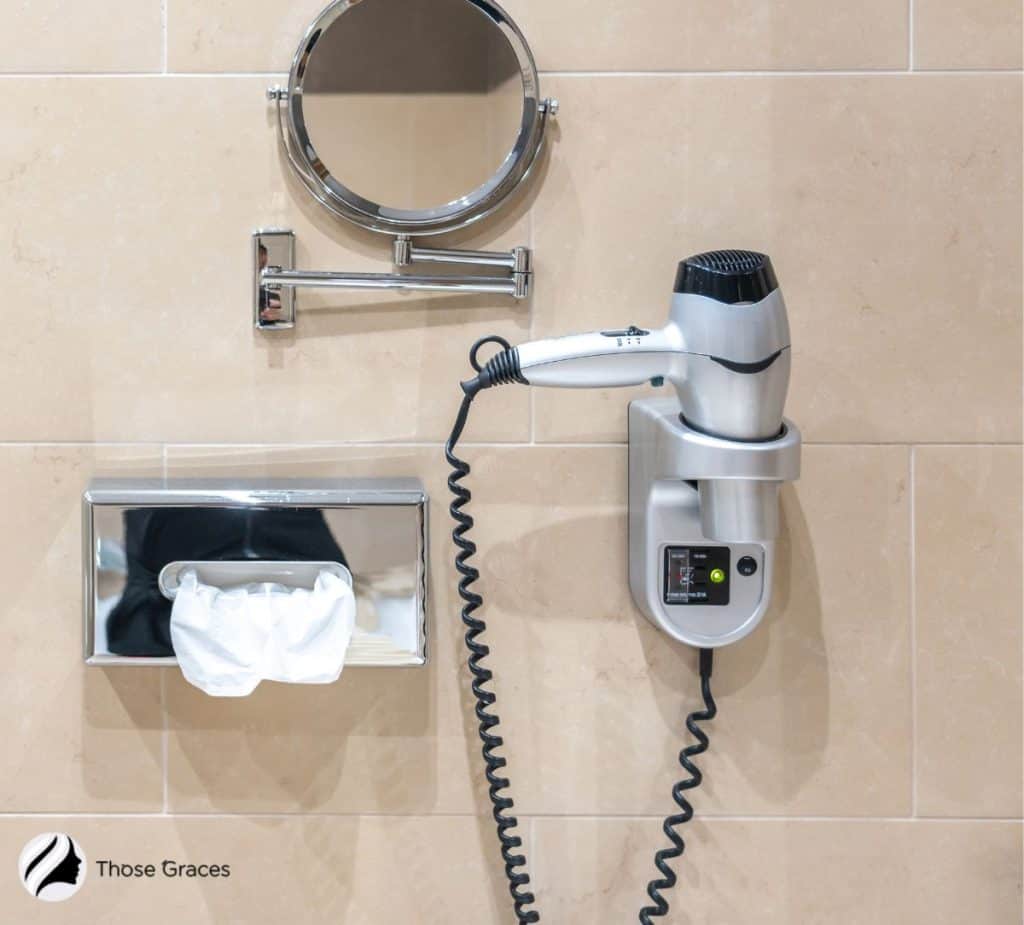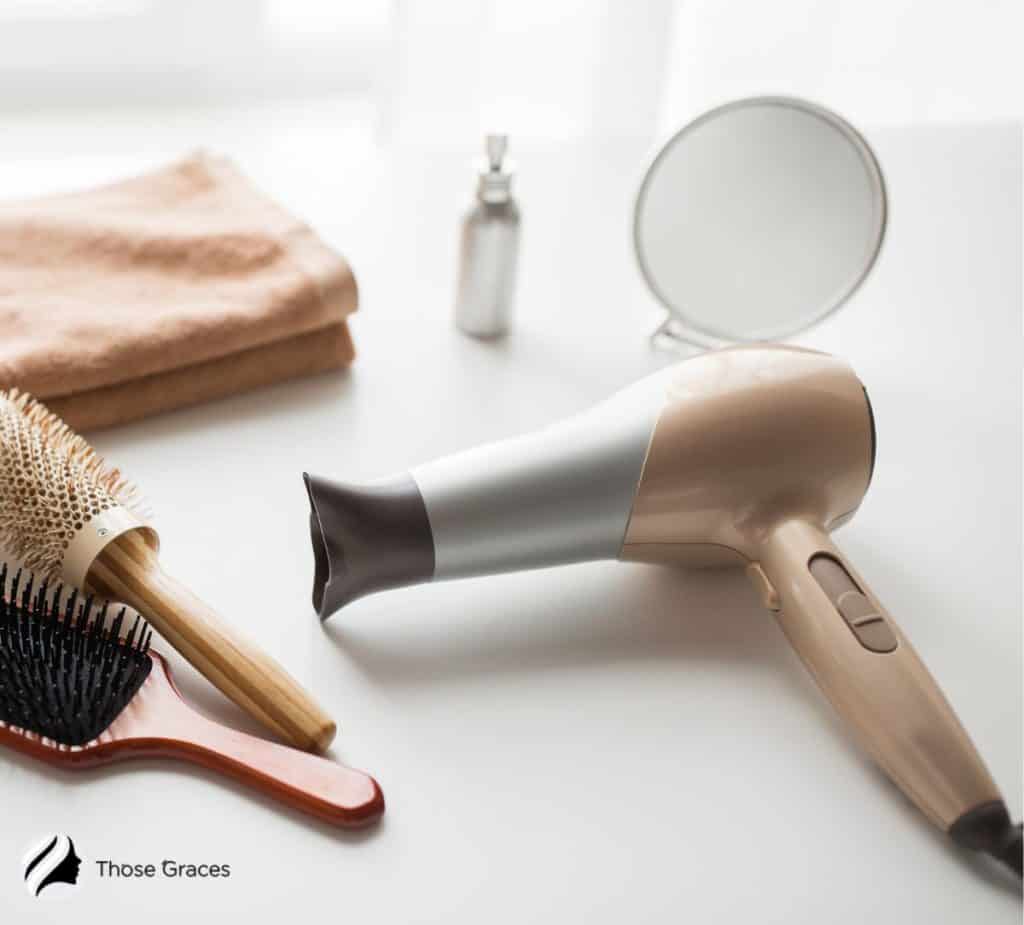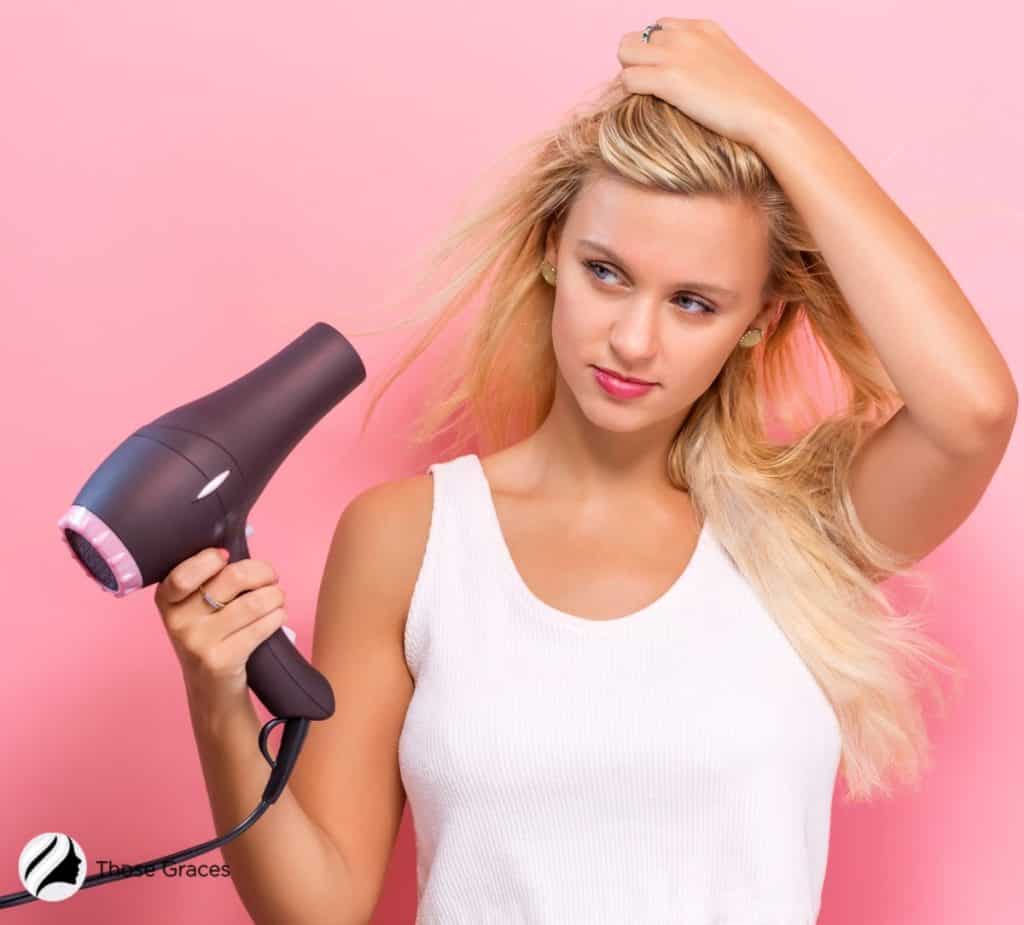Can you use a hairdryer after it gets wet, or is it dangerous?
We know we shouldn’t use ANY electrical appliance WHILE it’s still sopping wet, but what about later on after it dries out?
I spent hours searching for the answer (and I even asked an electrician) after I dropped my hairdryer in the toilet (don’t ask) last week.
Read on to find out what I learned!
Table of Contents
Can You Use Your Hairdryer After It Gets Wet?
Short answer, no. Regardless of how well or undamaged it looks on the outside, it would be best if you did not attempt to use the hairdryer once it gets wet.
That goes for any electrical appliances.
The moment they become submerged, they’re done, even if they’re equipped with GFCI (ground-fault circuit interrupter) protection (a fancy way of saying “they protect you from lethal shocks) [1].
The most appropriate action would be to buy a new hairdryer, for your protection and others. Your life is worth so much more than what a new hairdryer costs.
What happens if a hairdryer falls into the water?
So, what happens when your hairdryer falls in the tub or toilet? The answer depends on just how wet it gets.
If all of the components of the hairdryer become wet, the inner working of the dryer will likely get damaged.
When electrical products such as kitchen appliances, electric power tools, and hairdryers come into contact with water, they quickly become electrical hazards.
That’s because they are not water-resistant and are not intended to function when wet [2]. Water and electricity don’t mix, plain and simple.
In the 90s, hairdryer companies installed ground fault circuit interrupters on their cables [3].
These GFIs sensed potentially dangerous situations and shut off electricity to the device.
So accidentally dropping a hairdryer into a tub isn’t as likely to end in tragedy as it used to be.
Still, the things that protect you from deadly shocks also render your hairdryer unusable, at least for the foreseeable future.
To give you a better idea, check out this video demonstration by CTV Reporter Elizabeth Drolet and CSU Physics Professor Brian Jones [4]:
Before we move on to what to do if your hairdryer falls in the water, let’s quickly go over another common question related to this topic.
Can you leave a hairdryer plugged in?
Yes, you ‘can’ leave a hairdryer plugged in. The real question is whether you ‘should’ keep it plugged in – the answer is no [5].
This is especially true if it’s at risk of being pushed into a water source or knocked off a shelf, leaving it dangling by the plug. These can turn into potential electrical hazards.

Even if it is securely away from any body of water, leaving electronics plugged in when unused is not a good idea.
You should always unplug your hairdryer and tuck it into a safe place when not used; it is always better to be safe than sorry. Moreover, this safety measure will only take you a few seconds.
Got it? Good. Let’s move on.
5 THINGS TO DO When Your Hairdryer Falls in Water
When something falls, our instincts are to pick it up. DO NOT trust that instinct when you drop your hairdryer into the water. Instead, follow these safety tips.
1. Unplug the cord
If your hairdryer ever falls into bodies of water, the first thing to remember is to unplug the cord from the main outlet.
That will stop the electricity from the outlet from further interacting with the water through the hairdryer and prevent the risk of electrocution.
Under no circumstance should you attempt to pick up the hairdryer while it is still plugged in [6].
2. Drain the water
Even when unplugged, some appliances still have a residual charge, meaning you can still be shocked by them. So it’s important to drain the water before retrieving your hairdryer.
However, don’t just reach your hands into the tub and pull the drain stopper.
Instead, try using a non-conductive material to pull the plug [7]—for example, the dry wooden part of your toilet plunger handle or rubber tongs.
4. Let it dry out (Either in the tub or After Retrieving it)
If your hair dryer fell into the tub and you don’t need to use your shower, let it dry out while still sitting there.

On the other hand, if it falls into the toilet, you can’t let it sit there all day.
So go ahead and grab it (using rubber gloves), then set it someplace safe and out of the way to dry before throwing it away.
5. Throw it away
Since, at this point, your hairdryer components would have gotten wet and incurred permanent damage, it is not safe to use to dry wet hair. Throw it out.
If, for some reason, you are not willing to discard your hairdryer, then the ONLY alternative I am even remotely comfortable recommending is to take it to a professional so they can check it out and see if it’s safe to use.
A professional should do any components of your hairdryer that need fixing.
Water damage isn’t something to be taken lightly, and it’s certainly not a project you want to tackle alone.
In other words, you can’t just blot the water with a paper towel and call it a day!
Check out ‘Does cold hair dryer damage hair?’ to protect your locks from potential harm, and ‘How to blow dry curly hair without a diffuser‘ for effective curl-friendly techniques.
How To Secure Your Hairdryer To Avoid It From Falling Into Water
Do you know what they say? An ounce of prevention is worth a pound of the cure. So let’s look at some tips to avoid dealing with a sopping wet hairdryer in the first place.
Do Not Use Hairdryer Near Water
The best practice is to avoid using hairdryers near sinks, baths, or toilets. Although there are few chances of an electrical hazard occurring, thanks to the GFI outlets, you can never be too careful.

Keep Your Hairdryer On Dry Surfaces
Before plugging it in, ensure your work area is dry, and remove any glasses of water or other liquids.
I also like to grab a microfiber cloth and swipe it across the counter to ensure it’s dry.
Unplug Your Hairdryer
After using it, please turn off your hairdryer and unplug it from the wall.
Let it cool down, then store it safely and dryly.
FAQs on Using a Hairdryer After it Gets Wet
Can you use a hairdryer after it gets wet in the bathtub?
What is the correct way to unplug an appliance?
After that, turn off the main outlet switch and unplug your device. To unplug, grab the fat part of the plug and pull it straight out. Do not wiggle or twist the plug; remember never to pull on the cord.
Conclusion
The bottom line, it’s just not safe to use a hairdryer after it gets wet. Even if it looks like it’s still in perfect working condition on the outside, you have no way of knowing just how damaged it is inside.
So, for your safety and the safety of others, purchasing a new hairdryer is the best option to use your hairdryer after it gets wet.

What do you think? Can you use a hairdryer after it gets wet? Is there ever a “yes” answer, in your opinion? Share below!
References
- 1. Using A Portable Hair Dryer? A GFCI Could Save Your Life [Internet]. U.S. Consumer Product Safety Commission. 2021 [cited 2021 Dec 13]. Available from: https://www.cpsc.gov/Newsroom/News-Releases/1990/Using-A-Portable-Hair-Dryer-A-GFCI-Could-Save-Your-Life
- 2. Citizens Electric Fundamentals of Electricity [Internet]. Apogee.net. 2021 [cited 2021 Dec 13]. Available from: https://c03.apogee.net/mvc/home/hes/land/el?utilityname=citizenselectric&spc=foe&id=17557
- 3. Hairdryers and Electrocution: Real Threat or Hollywood Hype? – CED Technologies, Inc. [Internet]. CED Technologies, Inc. 2018 [cited 2021 Dec 13]. Available from: https://www.cedtechnologies.com/hairdryers-electrocution-real-threat-hollywood-hype/
- 4. Drolet E. Will taking a bath with a hairdryer really cause electrocution? [Internet]. YouTube. 2012 [cited 2021 Dec 13]. Available from: https://www.youtube.com/watch?v=q_XlOmT2Vl8
- 5. Fire Safety for the Home [Internet]. Nachi.org. 2021 [cited 2021 Dec 13]. Available from: https://www.nachi.org/fire-safety-home.htm
- 6. Felicity Stone. Hair Dryer Hazards [Internet]. Consumer Health News | HealthDay. Consumer Health News | HealthDay; 2002 [cited 2021 Dec 13]. Available from: https://consumer.healthday.com/general-health-information-16/injury-health-news-413/hair-dryer-hazards-510391.html
- 7. Staff Writer. What Are Some Examples of Non-Conductive Materials? [Internet]. Reference.com. amg; 2020 [cited 2021 Dec 13]. Available from: https://www.reference.com/science/examples-non-conductive-materials-b1a3e9874758485b


![How To Curl Short Hair With A Straightener [10 Best Ways]](https://thosegraces.com/wp-content/uploads/2024/07/How-To-Curl-Short-Hair-With-A-Straightener-211x150.jpg)
